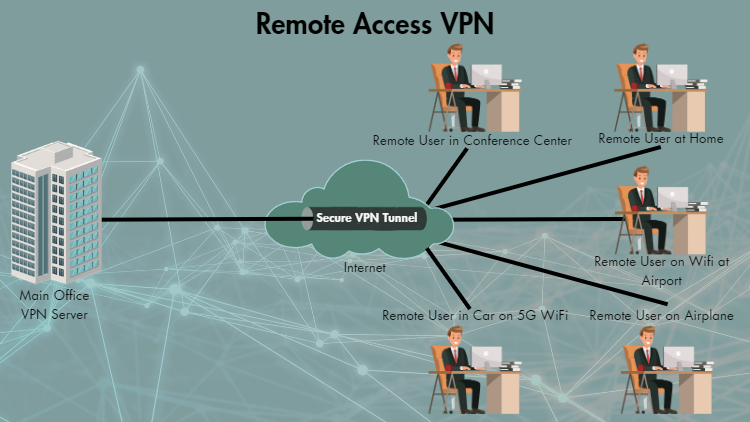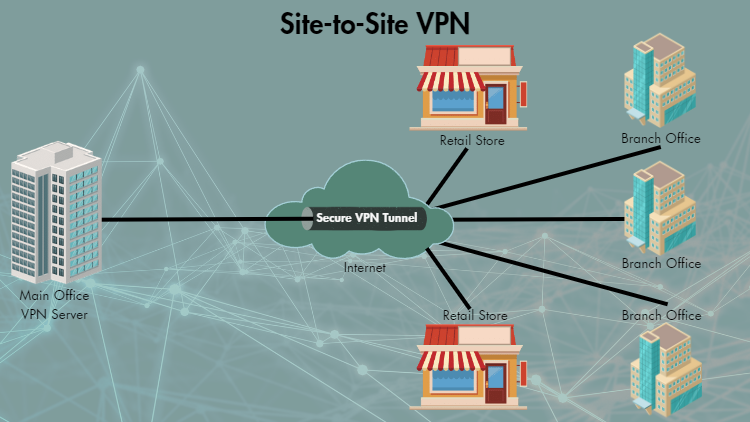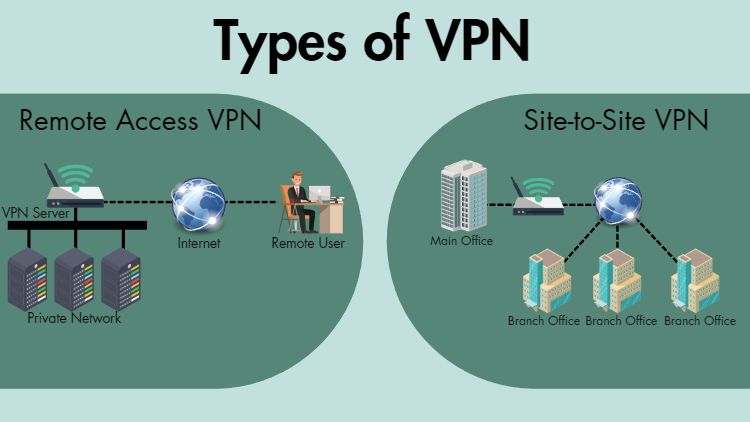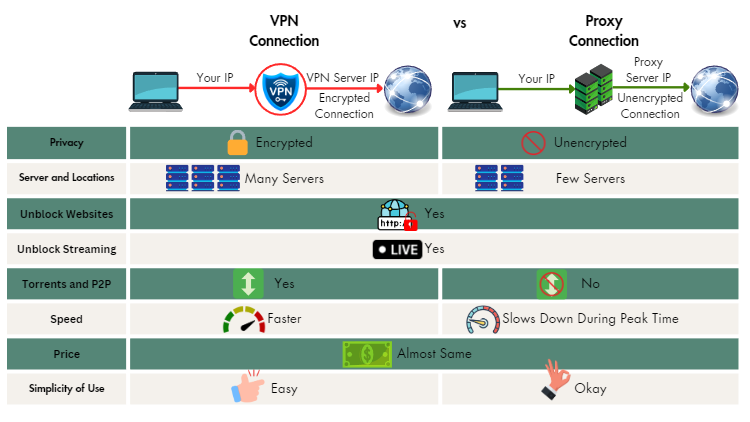When using a company VPN, “what can they see in real time” is a common question. Although working from home is an excellent option for many people, maintaining privacy from your employer is a top priority.
It’s become a classic dilemma, asking yourself, can my employer monitor my personal computer when I use it for work?
Understanding exactly what your employer has access to when you use your personal computer for remote work is the first step. So…with a company VPN, what can they see?
Can My Employer Monitor My Personal Computer?
Remote working is becoming more and more popular, especially after the past few years. But, not every remote worker can be issued a company computer, so many people use their personal devices to perform certain tasks from home.

But, just how invasive can your company be about your personal computer?
Understanding the answer to the question, can my employer monitor my personal computer, is an important aspect of choosing to work from home.
The thing to understand is that employers can monitor your personal computer only if you let them; if you are using your personal computer for work, there may be legal loopholes to monitor your activity, depending on the specific laws of your jurisdiction.
Virtual Private Networks (VPNs) are all about effectively hiding your location, even from sophisticated IT departments. But, they also do much more.
By understanding how these work, and how they are employed when a company VPN is used can help ensure you retain your privacy, even when using your personal computer for remote work.
Using VPN at Work (Company VPN: What Can They See)
By using your IP address, someone can easily know exactly where you are when you’re logging in from outside of the office.
A good way to think of it is the internet as a system of roads, some above ground and some below. You can travel from your device to an endpoint taking either road.
But, to anyone monitoring your activity online, it’s easy enough to see you when you’re above ground.
But, if you tunnel your way there, they won’t see where you’re coming from, they will only see where you come out of the ground.
The Federal Trade Commission and the Department of Labor have specific guidelines on employee monitoring in the workplace and the rights of both employers and staff.1, 2
If you are connecting your personal computer to the office network, there is again the possibility of your employer being able to monitor you. If you send an email, and your email has your IP address, the employer could easily detect your location, unless you used a VPN.
What Does a VPN Hide? Public vs Private VPNs
Knowing what information a virtual private network will hide is crucial to understanding the answer to the question, can my employer monitor my personal computer? In other words, with a company VPN, what can they see?
The first two solutions involve using a public VPN. This is the easiest to set up, but it’s not always 100% secure.
While your location may be private, the fact that you’re using a VPN will still be public information. This is because the IP addresses associated with many public VPNs are discoverable (albeit with some effort and technical skill).

So, although your supervisor may not be able to ask you, “Why are you logging in from Vegas?” they can still wonder, “Dude, why are you using a VPN?” If you’re in a foreign country, it may not be an easy question to answer.
Still, VPN software remains your most practical and best workaround because it’s generally the best option to mask your real location. A good public VPN is not free, although there are free options out there.
Although much more secure, private VPNs are annoyingly complicated, not to mention expensive to set up.3
At the base level, this is because encrypting and rerouting your connection takes resources and someone has to foot that bill. While there are a few free VPNs out there, they usually don’t work and your computer’s speed will be vastly reduced – ask anyone who has ever used TOR (aka the Onion Network).4
Using a VPN on a Work Computer (With a Company VPN: What Can They See?)
The second solution is to obtain a travel router. There may be situations where you want to use a travel router for your VPN for the specific features the router provides, namely its multiple connections.
Say for example you want to share a VPN connection across multiple devices (laptop, phone, etc.). This is helpful if you are traveling with other people who also want to take advantage of the VPN.
Work computers often come preloaded with only the apps you absolutely need for work, and you can install anything else, which might be yet another good reason to get a travel router.
Acting as a WiFi signal repeater, a travel router can confer a solid connection at your “home office” at the beach bar in Tulum. This should allow you to connect multiple devices simultaneously, regardless of whether those devices allow VPNs to be installed.
If you want to wall off your entire internet connection, not just your browser activity, it’ll be better to use the software of your OS (like Windows or MacOS) rather than one of the apps (or extensions) that you’ve added to your browser (Chrome, Firefox, Safari, etc.).
VPN software will ensure that no one can ascertain your actual location by checking your IP address.
Work VPN on Home Network
The third solution is to set up a private VPN. This is if you really require maximum privacy while working from anywhere.
When using a private VPN, it will actually look like you are logging in from your home. If your employer is sleuthing to see if you are using a public VPN, this is the safest option.
And it won’t be obvious to anyone that you are using a VPN at all! Even a top-notch IT department won’t notice anything different from your normal activity.

Sometimes, in certain companies, the IT department has an incentive to make sure that you are consistently using the IP address, rather than an IP log that bounces around the globe. In that case, a private network is the only way to keep up the pretense.
However, setting up a private VPN is pretty complicated, so it may be an impractical solution for the average remote worker, to say nothing of the cost.
Who Can Track Me Online Without a VPN?
If you have concerns regarding your privacy online, you must be wary because you can be followed by entities such as:5
- Internet service providers (ISPs) can monitor you on the internet and curb your traffic
- Employers and associated IT departments
- Governments, foreign and domestic
- Hackers
- A wide variety of commercial enterprises that seek to gather data for commercial ends
The good thing is that having a VPN hides your IP while encrypting your internet traffic and offers you online privacy. There are also government agencies and other like-minded entities who can approach ISPs to get online data about you.
What Exactly Does a VPN Hide? How Can I Be Untraceable?
If all these things seem complicated to you, it’s important to remember why you got one in the first place. No one wants to be surveilled or tracked – even if you’re not doing anything illegal or creepy.
Plus, just maybe an illegal activity in one country is morally laudable in another.
This is why you must step up your privacy game. The purpose of VPNs is to conceal your IP address while creating an anonymous and fully encrypted tunnel for your data, allowing you to use public Wi-Fi hotspots without being subject to snooping.5
Can Work VPN See My Traffic?
If you are wondering, “Can a business VPN see my traffic?”, the answer is a resounding yes. If your work is providing you with a VPN, this can be a problem; your employer could easily monitor your activities, as they have access to the VPN servers.
This is true even if you are using your home computer, or home network to access the work VPN.
So, when using a company VPN, what can they see…your personal internet traffic.
VPN Employer Monitoring
With the explosion in remote work and studies purporting a drop in office productivity, monitoring employee online activity is now increasingly prevalent. So, not only can your employer keep tabs on your traffic from a technical point of view, they may have the motivation and the intention to do so.
There may even be an administrative process of measuring which employees are “erring” and that decision-making process may lead to financial and career consequences for the unwary employee, which hopefully is not you.
How Can You Tell If Someone Is Using a VPN?
It is not easy to figure out if someone is employing a VPN.
The primary way to tell if a VPN is in play is if their IP address is a known public IP address associated with a VPN. Otherwise, it’s a black box.
If you notice that someone is logging in from Canada one morning, then the Netherlands in the evening, and Hong Kong the next day, you can be damn near certain they are using a VPN.
Employer Can Monitor Your Work Computer?
From a legal point of view, employers do have the right to monitor company-owned computers. This is to be able to observe employer productivity, which is difficult to gauge in many circumstances.
Another reason could be to make sure confidential data and proprietary information is being properly handled. This does not mean employers have the right to spy on your personal life, but one has to be careful to keep their personal activities separate from their workplace.
The typical method used for monitoring employees is by using software specially designed to monitor employees.
Can Your VPN Be Traced? How Can Your VPN Be Traced?
It is generally impossible to trace you through a VPN unless it is a work VPN provided by your employer, in which case they control the servers.
The CIA, NSA, FBI, and other intelligence organizations try to track people sometimes by setting up honeypot VPNs, in which case they are able to trace whoever uses those VPNs.
Another possibility is if the VPN service you are using is cooperating with the authorities to trace you.
How Can I Figure Out If My VPN Is Working? How To Check If Your VPN Is Working
To make sure your VPN is working, first, make sure your VPN is totally updated, then turn it off, and search for your IP address by typing in Google “What is my IP address.”6
Write down what Google tells you.
Now, turn on the VPN and do the same search again. If the IP address is different from the first try, the VPN is bestowing some anonymity to your online activity.
If you see your original IP address, it’s obviously not disguising your computer.
How Many People Use VPNs?
To those wondering, How many people use VPNs?
Most people resort to using a VPN to protect their privacy online. In 2020, people from 85 selected countries used VPNs over 277 million times.
In 2021, the number was up to 785 million. In 2022, VPN downloads went up to 353 million.
A recent survey by the University of Chicago also showed some of the reasons people are using VPNs.7
Does VPN Hide History From Employer?
No. If you are using your work computer, your browser history is already stored.
Even if you use a VPN, the computer will still store that information, unless you wipe your browser history or use incognito mode.
Keep in mind that simply deleting data on your computer won’t really delete it, you may need to find a way to permanently delete data, perhaps with a shredding tool.8
Is VPN on Work Computer Effective? Can I Be Tracked if I Use a VPN?
Yes, if you are using their computer, they certainly can. Even if you are not using their computer, if they know your IP address, they can totally track your activities, irrespective of whether you’re connected to their VPN or not.
Even if your VPN conceals your IP address, your company could still sneak into your work computer through a backdoor if they get suspicious and decide to be nosey, which is more common than you might think. More details below.
Can My Employer Track My Activity if I’m Not Connected To Their VPN?
If you are at your office using a VPN, the IT department may not be able to see anything other than the VPN connection itself. That in itself is enough to raise questions.
However, if you are using a work computer, they may be able to access the computer and check out what you are up to in your browser history, or even remotely pull up your computer and peep the same screen you have in front of you.
In short, your personal surfing habits aren’t safe. The same holds true if you are working remotely.
How To Use Omegle With a VPN?
Many virtual private networks perform the following tasks following: receiving all your internet traffic and sending it through an encrypted tunnel to a secure server location that behaves like a location proxy for your device.9

Once you get on a VPN server, it supplants your IP address with an innocuous one. If your original IP address has been banned by Omegle, then the VPN will let you get on Omegle as usual.
If your government or institution blocks Omegle, all you have to do to gain access is connect to a server in a Western country where Omegle is available.
Can Citrix Workspace Spy on You?
Many people wonder if employers can spy on your activity on your home computer using Citrix/Terminal Server sessions from your work computer. In general, they can get data about what websites you visit if you’re connected through a VPN your employer uses.10
Citrix, Remote Desktop, Splashtop, TeamViewer, and Terminal server sessions are not created to get into your home computer, so there’s no need to be concerned about your personal computer being spied on via a remote desktop session, but you probably want to avoid web browsing that you don’t want your boss to observe.
If they penetrate your VPN, hackers might be able to access your personal files but not those of your employer.
Peerblock vs VPN: Which VPN To Choose To Prevent Tracking
PeerBlock is basically a personal firewall that blocks packets traveling to and from black-listed hosts. It’s different from a VPN because a VPN doesn’t display your real IP address, while PeerBlock simply stops certain hosts from observing your traffic.
VPN is a better solution than PeerBlock, as you’re not exposing your real IP address to start off with.
If a monitoring agency is able to avoid a blacklist and sees your IP address, then they will only see the VPN’s IP address. Until the network is established securely, many VPNs use a kill switch to block traffic.11
Not all VPNs were created equal, and it’s unfortunate because when they fail, they betray their users and can actually put lives at risk. When downloading torrents with a VPN, you are looking for speed, shared IP addresses, and a kill switch.
The use of speed is self-explanatory. Each layer added to your network connection builds some latency.
There is no way around that, but a fast VPN provider can minimize the effect.
A part of VPN privacy is dependent on how it handles IP address assignments. VPNs that borrow shared IP addresses are better for torrenting because many people are utilizing that IP at the same time.
It is harder to track the IP address seen in the swarm back to you for that purpose at that time.
And the kill switch, as mentioned, is another crucial feature. VPNs can be unreliable and unexpectedly drop connections.
A lot of VPN customers will reconnect when that happens, but for that small period of time, while it is reconnecting, your real IP address can be exposed to the swarm.
A kill switch feature stops that from happening because it blocks internet activity until the VPN connection is reestablished.
Does a VPN Carbon Footprint Exist?
Using the internet causes CO2 emissions as a byproduct, accounting for 3.7% of greenhouse gas emissions globally.12 Our devices and the data centers that support them also contribute to that percentage, which is predicted to rise 100% just in the next two years.13
Even VPNs and their information architecture add to the global greenhouse gases, and currently, centralized VPN companies dominate the market.
These companies contribute to climate change due to their energy inefficiency and rely on big datacenters for VPN nodes. VPN companies need a centralized master node and node query system, which uses a large amount of energy from the computing involved.
It’s the same story as many tech companies. VPN companies use large data centers connected to the power grid from which their energy needs escalate as they grow.14
The takeaway here is that the market-leading apps for privacy are unsustainable for the environment.
While these giant figures can be intimidating—especially if you use the internet for work—the good news is that you’re not completely helpless to make a difference.
However, they can be made sustainable when carbon offsets from tree planting and other programs are employed to erase the additional emissions generated by their use.
With the demand for VPN organizations, users can expect their computing power to increase, especially as new tech services and accessibility to hi-tech solutions expand across the globe.
So when asking about a company VPN, what can they see, the answer will depend on what you allow on your personal device.
Frequently Asked Questions About Company VPN, What Can They See?
Can My Company See My Remote Desktop?
Employers have the right and often the technical ability to see your remote desktop, but only for your work computer. They can get into trouble if they surveil your personal computer but if it’s your work computer, it’s open season, so it’s definitely the smart move not to use your work computer for your personal browsing.
What Does a Corporate VPN Connection Do?
Just as when you choose a VPN to protect your data and privacy, a company uses a VPN to secure its data and connections. This way sensitive information can be protected from hackers, corporate spies, disgruntled employees, and other adverse parties.13
Can My Employer See My Browsing History In Incognito Mode?
No, the incognito mode does a good job of getting rid of browsing history for the session. However, if you are browsing from a company-provided computer, using the internet provided by your company, or their VPN, they can still see what websites you visited.
Can My Employer See My Internet Activity On My Personal Phone?
Yes, if you are connecting your phone to the company wifi, your privacy is not secure. Similarly, if your company knows the IP address of your phone, they may decide to monitor it.
Where Can I Learn How To Do a Simple VPN Detection Test?
Without first using your VPN, write “what is my IP address” on Google, noting the address. Then do the same with the VPN on, if you’re getting the same IP as before, your VPN is bunk.
References:
- Federal Trade Commission. (October 2016). Protecting Personal Information: A Guideline for Business. Federal Trade Commission. Retrieved May 16, 2023, from https://www.ftc.gov/business-guidance/resources/protecting-personal-information-guide-business
- Levinson, A. (June 2015). Carpe Diem: Privacy Protection in Employment Act. Akron Law Review. Retrieved May 16, 2023, from https://ideaexchange.uakron.edu/cgi/viewcontent.cgi?article=1126&context=akronlawreview
- Drexel University. (2023). Risk of using third-party VPNs. Drexel University. Retrieved May 16, 2023, from https://drexel.edu/it/help/viruses/thirdparty-vpn-risks/
- Sun, Y. (2017, September 11). The Onion Router. Princeton University. Retrieved May 16, 2023, from https://www.cs.princeton.edu/courses/archive/fall17/cos561/docs/tor.pdf
- Šimkevičiūtė, S. (2022, June 19). Can you be tracked with a VPN? NordVPN. Retrieved May 16, 2023, from https://nordvpn.com/blog/can-you-be-tracked-with-a-vpn/
- Avast Academy. (2023). How to check if your VPN is working. Avast. Retrieved May 16, 2023, from https://www.avast.com/c-check-vpn-working
- Dutkowska-Zuk, A., Hounsel, A., Morrill, A., et al. (2022, August 10). How and why people use virtual private networks. University of Chicago. Retrieved May 16, 2023, from https://airlab.cs.uchicago.edu/files/2022/11/sec22-dutkowska-zuk.pdf
- Hardt, C. (2021, March 26). Using a VPN for Personal Data Protection. Northwestern University. Retrieved May 16, 2023, from https://sites.northwestern.edu/secureit/2021/03/26/using-a-vpn-for-personal-data-protection/
- ExpressVPN. (2023). What is Omegle? ExpressVPN. Retrieved May 16, 2023, from https://www.expressvpn.com/vpn-service/unblock-omegle
- Klosowski, T. (2021, February 10). How your boss can use your remote-work tools to spy on you. New York Times. Retrieved May 16, 2023, from https://www.nytimes.com/wirecutter/blog/how-your-boss-can-spy-on-you/
- Watson, J. (2023, January 28). Peerblock vs. VPN: Which is a better solution for torrenting? Comparitech. Retrieved May 16, 2023, from https://www.comparitech.com/blog/vpn-privacy/peerblock-vs-vpn-torrenting/
- Alvarez, D. M. (2020, June 8). Digital Sustainability Audits: A de facto standard for the internet carbon footprint. Universitat Oberta Catalunya. Retrieved May 16, 2023, from https://openaccess.uoc.edu/bitstream/10609/116446/6/dmonTFM0620memory.pdf
- Griffiths, S. (2020, Maarch 5). Why your internet habits are not as clean as you think. BBC. Retrieved May 16, 2023, from https://www.bbc.com/future/article/20200305-why-your-internet-habits-are-not-as-clean-as-you-think
- Edlebeck, D. (2022, February 4). Why Your VPN should be a dVPN and should be green. Coruzant. Retrieved May 16, 2023, from https://coruzant.com/security/why-your-vpn-should-be-a-dvpn-and-should-be-green/
